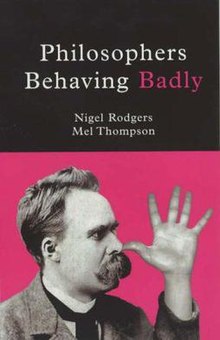 | |
| Author | Nigel Rodgers, Mel Thompson |
|---|---|
| Country | England |
| Language | English |
| Subject | Philosophy |
| Published | 2004 |
| Publisher | Peter Owen Publishers |
| Pages | 256 |
| ISBN | 0720612195 |
Philosophers Behaving Badly is a 2004 book by Nigel Rodgers and Mel Thompson.
 | |
| Author | Nigel Rodgers, Mel Thompson |
|---|---|
| Country | England |
| Language | English |
| Subject | Philosophy |
| Published | 2004 |
| Publisher | Peter Owen Publishers |
| Pages | 256 |
| ISBN | 0720612195 |
Philosophers Behaving Badly is a 2004 book by Nigel Rodgers and Mel Thompson.
The book's thesis is that the work and teachings of great philosophers cannot and should not be separated from their personal lives and problems. [1] [2] In this respect, the book's approach is completely new. [3] The authors give as evidence numerous examples from the lives of 8 great philosophers (Jean-Jacques Rousseau, Arthur Schopenhauer, Friedrich Nietzsche, Bertrand Russell, Ludwig Wittgenstein, Martin Heidegger, Jean-Paul Sartre and Michel Foucault) [4] [5] [6] to prove their claims. They emphasize, however, that their findings do not invalidate the thought of the philosophers concerned, but shed new light on an old subject. They show how the work of philosophers relates to their experiences as men. Of all the eight translations, the German title - Philosophers Like Us: Great Thinkers Considered as Human Beings - probably captures most accurately the intention of the authors.
The book was published in the UK by Peter Owen Publishers and was praised as "fascinating and revealing" by Richard Edmonds in The Birmingham Post [7] and by Peter Watson in Times Higher Education as "excellent", although Watson finally found its arguments rather inconclusive. [8]
In ethical philosophy, ethical egoism is the normative position that moral agents ought to act in their own self-interest. It differs from psychological egoism, which claims that people can only act in their self-interest. Ethical egoism also differs from rational egoism, which holds that it is rational to act in one's self-interest. Ethical egoism holds, therefore, that actions whose consequences will benefit the doer are ethical.
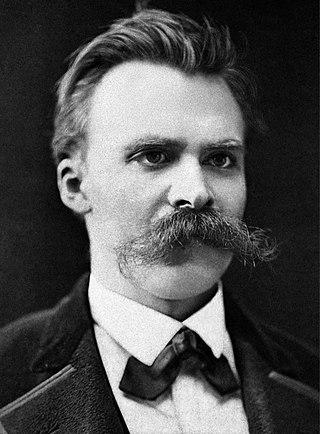
Friedrich Wilhelm Nietzsche was a German philosopher, prose poet, cultural critic, philologist, and composer whose work has exerted a profound influence on contemporary philosophy.

Beyond Good and Evil: Prelude to a Philosophy of the Future is a book by philosopher Friedrich Nietzsche that covers ideas in his previous work Thus Spoke Zarathustra but with a more polemical approach. It was first published in 1886 under the publishing house C. G. Naumann of Leipzig at the author's own expense and first translated into English by Helen Zimmern, who was two years younger than Nietzsche and knew the author.
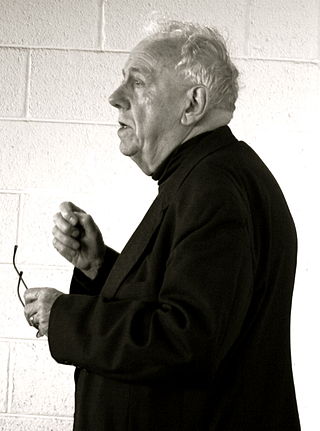
Alasdair Chalmers MacIntyre is a Scottish-American philosopher who has contributed to moral and political philosophy as well as history of philosophy and theology. MacIntyre's After Virtue (1981) is one of the most important works of Anglophone moral and political philosophy in the 20th century. He is senior research fellow at the Centre for Contemporary Aristotelian Studies in Ethics and Politics (CASEP) at London Metropolitan University, Emeritus Professor of Philosophy at the University of Notre Dame, and permanent senior distinguished research fellow at the Notre Dame Center for Ethics and Culture. During his lengthy academic career, he also taught at Brandeis University, Duke University, Vanderbilt University, and Boston University.

Walter Arnold Kaufmann was a German-American philosopher, translator, and poet. A prolific author, he wrote extensively on a broad range of subjects, such as authenticity and death, moral philosophy and existentialism, theism and atheism, Christianity and Judaism, as well as philosophy and literature. He served more than 30 years as a professor at Princeton University.

Philippa Ruth Foot was an English philosopher and one of the founders of contemporary virtue ethics, who was inspired by the ethics of Aristotle. Along with Judith Jarvis Thomson, she is credited with inventing the trolley problem. She was elected a member of the American Philosophical Society. She was a granddaughter of the U.S. President Grover Cleveland.
Olga Kosakiewicz was a French theater actress.

After Virtue: A Study in Moral Theory is a book on moral philosophy by the philosopher Alasdair MacIntyre. MacIntyre provides a bleak view of the state of modern moral discourse, regarding it as failing to be rational, and failing to admit to being irrational. He claims that older forms of moral discourse were in better shape, particularly singling out Aristotle's moral philosophy as an exemplar. After Virtue is among the most important texts in the recent revival of virtue ethics.
Bianca Lamblin was a French writer who had affairs with philosophers Jean-Paul Sartre and Simone de Beauvoir for a number of years. In her book Mémoires d'une jeune fille dérangée, she wrote that, while a student at Lycée Molière, she was sexually exploited by her teacher Beauvoir, who was in her 30s. In correspondence between Sartre and Beauvoir, the pseudonym Louise Védrine was used when referring to Bianca in Lettres au Castor and Lettres à Sartre.
Wanda Kosakiewicz, French theatre actress in the 1940s, was one of Jean-Paul Sartre's love interests and Olga Kosakiewicz's sister. Sartre wrote that she was one of the reasons that his friendship with Albert Camus went sour. Her relations with both rival philosophers featured in the book The Boxer and the Goalkeeper by Andy Martin ; she appears as Wanda in Lettres à Sartre, and Tania in Lettres au Castor.
Wittgenstein's Poker: The Story of a Ten-Minute Argument Between Two Great Philosophers is a 2001 book by BBC journalists David Edmonds and John Eidinow about events in the history of philosophy involving Sir Karl Popper and Ludwig Wittgenstein, leading to a confrontation at the Cambridge University Moral Sciences Club in 1946. The book was a bestseller and received positive reviews.

Sarah Kofman was a French philosopher.
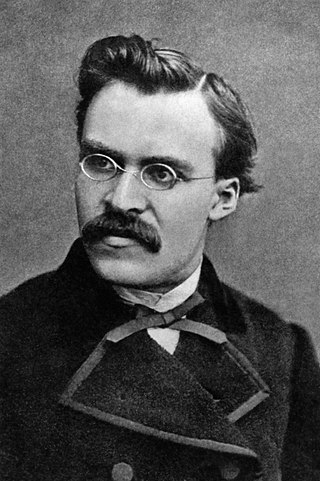
Friedrich Nietzsche's influence and reception varied widely and may be roughly divided into various chronological periods. Reactions were anything but uniform, and proponents of various ideologies attempted to appropriate his work quite early.
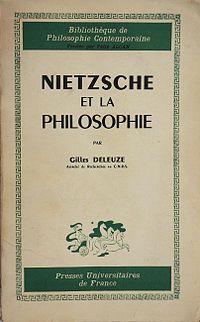
Nietzsche and Philosophy is a 1962 book about Friedrich Nietzsche by the philosopher Gilles Deleuze, in which the author treats Nietzsche as a systematically coherent philosopher, discussing concepts such as the will to power and the eternal return. Nietzsche and Philosophy is a celebrated and influential work. Its publication has been seen as a significant turning-point in French philosophy, which had previously given little consideration to Nietzsche as a serious philosopher.
Ivan Soll is an American philosopher who is a Professor Emeritus in the Department of Philosophy at the University of Wisconsin–Madison in the United States. He taught at UW from 1965 until his retirement in May 2011. His teaching and research focused on the philosophy of Friedrich Nietzsche, German philosophy in general, existentialism, aesthetics, and various figures of continental philosophy.
Some observers believe that existentialism forms a philosophical ground for anarchism. Anarchist historian Peter Marshall claims "there is a close link between the existentialists' stress on the individual, free choice, and moral responsibility and the main tenets of anarchism".

Gary Cox is a British philosopher and biographer and the author of several books on Jean-Paul Sartre, existentialism, general philosophy, ethics and philosophy of sport.

Nietzsche: Philosopher, Psychologist, Antichrist is a book about the German philosopher Friedrich Nietzsche by the philosopher Walter Kaufmann. The book, first published by Princeton University Press, was influential and is considered a classic study. Kaufmann has been credited with helping to transform Nietzsche's reputation after World War II by dissociating him from Nazism, and making it possible for Nietzsche to be taken seriously as a philosopher. However, Kaufmann has been criticized for presenting Nietzsche as an existentialist, and for other details of his interpretation.

Nigel Rodgers is a British writer, environmentalist and critic.
Mel Thompson is an English writer and philosopher. He was formerly a teacher, editor and A level examiner.